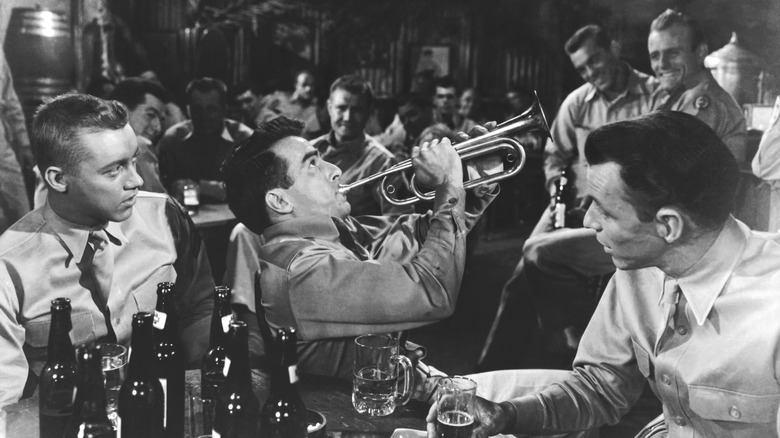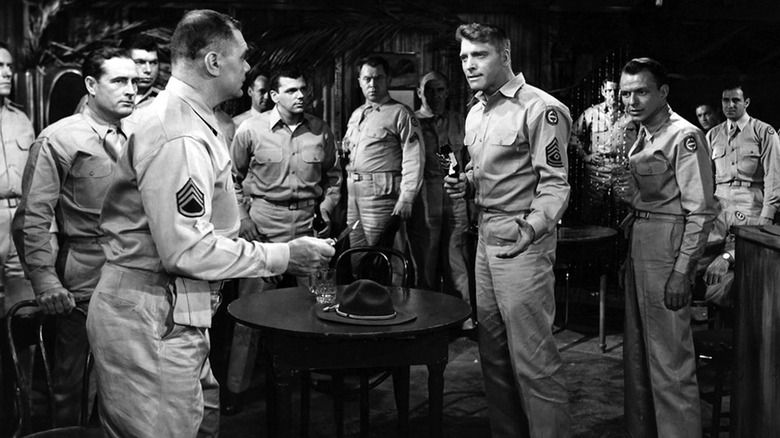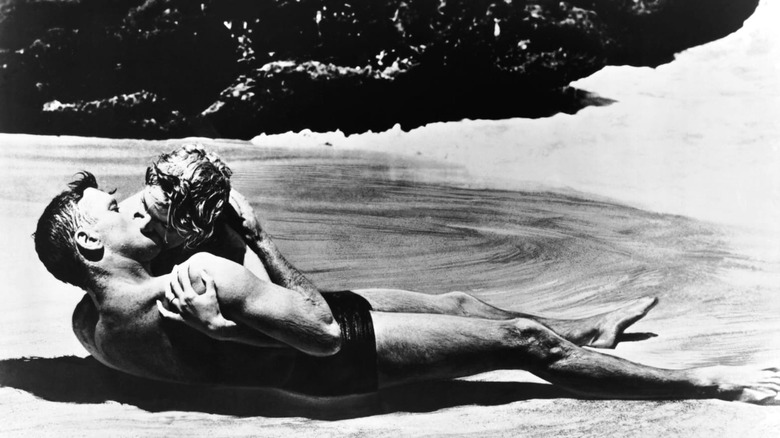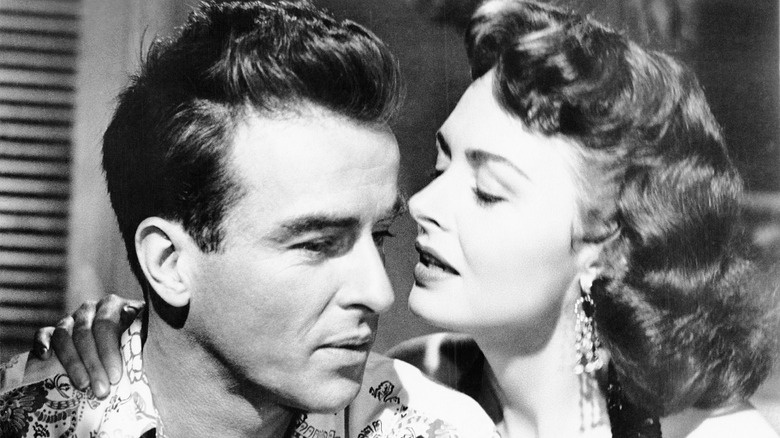From Here To Eternity Ending Explained: Was It Worth It?
If "From Here to Eternity" has one defining legacy, it would be the tapestry of characters and storylines it presents. Following three separate threads, which are all given a time in the spotlight, every actor in the core ensemble gets a complete arc. In fact, the broad attention to its characters would reflect in the career opportunities that opened for each of those actors following the movie's critical and box office success.
Like any movie about Pearl Harbor, "From Here to Eternity" is a tragedy. For 1953, and especially with the Hays Code restricting its use of violence and obscenity, its depiction of the Japanese attack in its last few minutes is brutal, with enemy planes shown gunning down soldiers point-blank. But even with these brief moments of carnage, the more prominently featured tragedies are in the characters' personal lives.
Private Angelo Maggio
When Columbia Pictures purchased the film rights for James Jones' 1951 novel, Frank Sinatra, whose career had stalled at the time, basically begged studio executive Harry Cohn to let him play Maggio, even offering to do it for free. Through the help of his mistress and future wife, actress Ava Gardner, (or the mob, if you ask Francis Ford Coppola) Sinatra got the part that would land him an Academy Award for Best Supporting Actor.
Sinatra's interest in the role (beyond reviving his film career) was not only that he shared Maggio's Italian-American background but also that he related to the character's "tough" attitude. Maggio's demeanor gets him into trouble when the nefarious Sergeant "Fatso" Judson (Ernest Borgnine) insults him by kissing a photo of his sister and whispering a slur for Italians to Prewitt. Though Prewitt is first to get up, Maggio waves him back — as the good friend that he can sometimes be — before swinging a barstool at Judson. At this point, Maggio becomes a mirror image of Prewitt, showing what happens when you stop resisting the urge to fight.
Warden intervenes, but Maggio seems disturbed. He begins drinking too much, and abandons guard duty, earning himself a sentence in the disciplinary stockade, where Judson nearly kills him. As he dies in Prewitt's arms, he explains how he escaped on a truck but gravely injured himself by falling off the back.
In Jones' book, Judson helps run the stockade, and Jones intended Maggio's abuse to represent military corruption. The U.S. Army, however, asked to instead have Judson act without authority. As a result, the message behind Maggio's character becomes a bit warped, as he is as much a victim of his own impulses as systematic mistreatment. Either way, Maggio serves a premonition, as the first tragedy in a series to come.
Warden, Karen, and Holmes
First Sergeant Milton Warden and Karen Holmes — played by future Academy award winner Burt Lancaster and the already-nominated Deborah Kerr — have the sexiest arc in "From Here to Eternity." This is obvious from the lasting iconography of the movie poster showing the two kissing on Halona Beach Cove in Honolulu. But their story is also not lacking its own tragedy.
Karen is an unfortunate figure on her own. Her husband is the adulterating Captain Holmes (Philip Ober), while a miscarriage in her past prevents her from having children. Though they share an instant physical connection, she and Warden also have a rocky start that begins with him shaming her for past relationships with men outside of her marriage. Even after they work past this, Warden is unable to overcome his aversion to becoming a military officer, which Karen needs in order to divorce Holmes and marry Warden.
Holmes, who in the book is promoted rather than disciplined for his mistreatment of Prewitt, chooses to resign, forcing him and Karen to return to the continental U.S. This was another alteration demanded by the Army, which wanted there to be consequences for Holmes' behavior. Director Fred Zinneman describes the scene where Holmes is faced with resigning or a court martial as "the worst moment in the film."
Although Karen and Warden's romantic arc ends in sadness, at least they are fortunate enough to survive. With her marriage to Holmes left unresolved, we can only hope that Karen goes on to separate from her husband and find new love. And even if Warden could not change for Karen, he does appear to have changed for the better, as one of the few higher ranking soldiers who had the courage to defend Prewitt against Holmes.
Prewitt and Lorene (aka Alma)
Private Prewitt, played by Montgomery Clift — who Zinneman convinced a reluctant Harry Cohn to cast based on the novel's description of a "deceptively slim young man" — spends most of the film objecting to Captain Holmes' efforts to bully him into joining the boxing team. Given that he caused a man to go blind in his last match, his opposition to fighting is fully justified. Only in self-defense, and later when Judson's actions lead to Maggio's death, does Prewitt give in to fighting.
As resolute as Prewitt is against revisiting boxing, he is equally committed to serving his country, as a self-proclaimed "30-year man" for the Army. When the Japanese attack on Pearl Harbor begins, Prewitt returns to his post even though he murdered a fellow serviceman and has not recovered from wounds he sustained in the knife fight. Fearful of being questioned for why he was not with the company, Prewitt cuts across a golf course, and military police gun him down for refusing to halt.
Because Prewitt's death is so sudden and needless, we can rightfully wonder why he would willingly subject himself to it. He and his love interest have different visions for their future, with him planning to serve indefinitely and her planning to move back to Oregon. However, Prewitt and Lorene — or Alma outside of the social club, played by Best Supporting Actress winner, Donna Reed — do not necessarily have to end things so soon.
Instead of staying with Lorene and waiting out the Pearl Harbor attack, which could be the distraction he needs to get off free, Prewitt risks his life. He will not fight for sport, but he will fight in a war for his country. It is for the audience to decide if death is worth the courage of one's convictions.



